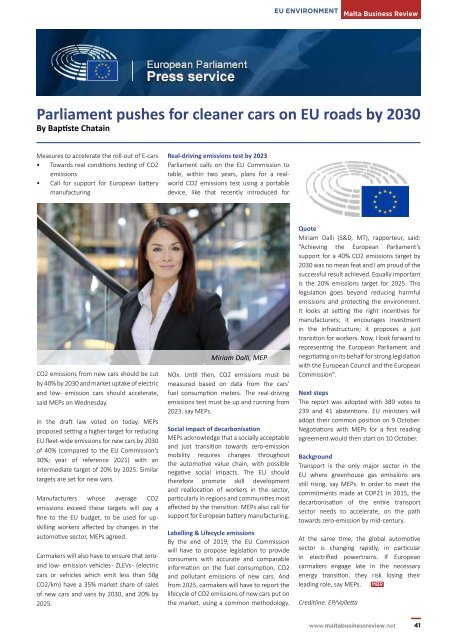MBR final low res
Create successful ePaper yourself
Turn your PDF publications into a flip-book with our unique Google optimized e-Paper software.
EU ENVIRONMENT<br />
Malta Business Review<br />
Parliament pushes for cleaner cars on EU roads by 2030<br />
By Baptiste Chatain<br />
Measu<strong>res</strong> to accelerate the roll-out of E-cars<br />
• Towards real conditions testing of CO2<br />
emissions<br />
• Call for support for European battery<br />
manufacturing<br />
Real-driving emissions test by 2023<br />
Parliament calls on the EU Commission to<br />
table, within two years, plans for a realworld<br />
CO2 emissions test using a portable<br />
device, like that recently introduced for<br />
CO2 emissions from new cars should be cut<br />
by 40% by 2030 and market uptake of electric<br />
and <strong>low</strong>- emission cars should accelerate,<br />
said MEPs on Wednesday.<br />
In the draft law voted on today, MEPs<br />
proposed setting a higher target for reducing<br />
EU fleet-wide emissions for new cars by 2030<br />
of 40% (compared to the EU Commission’s<br />
30%; year of reference 2021) with an<br />
intermediate target of 20% by 2025. Similar<br />
targets are set for new vans.<br />
Manufacturers whose average CO2<br />
emissions exceed these targets will pay a<br />
fine to the EU budget, to be used for upskilling<br />
workers affected by changes in the<br />
automotive sector, MEPs agreed.<br />
Carmakers will also have to ensure that zeroand<br />
<strong>low</strong>- emission vehicles - ZLEVs - (electric<br />
cars or vehicles which emit less than 50g<br />
CO2/km) have a 35% market share of sales<br />
of new cars and vans by 2030, and 20% by<br />
2025.<br />
Miriam Dalli, MEP<br />
NOx. Until then, CO2 emissions must be<br />
measured based on data from the cars’<br />
fuel consumption meters. The real-driving<br />
emissions test must be up and running from<br />
2023, say MEPs.<br />
Social impact of decarbonisation<br />
MEPs acknowledge that a socially acceptable<br />
and just transition towards zero-emission<br />
mobility requi<strong>res</strong> changes throughout<br />
the automotive value chain, with possible<br />
negative social impacts. The EU should<br />
therefore promote skill development<br />
and reallocation of workers in the sector,<br />
particularly in regions and communities most<br />
affected by the transition. MEPs also call for<br />
support for European battery manufacturing.<br />
Labelling & Lifecycle emissions<br />
By the end of 2019, the EU Commission<br />
will have to propose legislation to provide<br />
consumers with accurate and comparable<br />
information on the fuel consumption, CO2<br />
and pollutant emissions of new cars. And<br />
from 2025, carmakers will have to report the<br />
lifecycle of CO2 emissions of new cars put on<br />
the market, using a common methodology.<br />
Quote<br />
Miriam Dalli (S&D, MT), rapporteur, said:<br />
“Achieving the European Parliament’s<br />
support for a 40% CO2 emissions target by<br />
2030 was no mean feat and I am proud of the<br />
successful <strong>res</strong>ult achieved. Equally important<br />
is the 20% emissions target for 2025. This<br />
legislation goes beyond reducing harmful<br />
emissions and protecting the environment.<br />
It looks at setting the right incentives for<br />
manufacturers; it encourages investment<br />
in the infrastructure; it proposes a just<br />
transition for workers. Now, I look forward to<br />
rep<strong>res</strong>enting the European Parliament and<br />
negotiating on its behalf for strong legislation<br />
with the European Council and the European<br />
Commission".<br />
Next steps<br />
The report was adopted with 389 votes to<br />
239 and 41 abstentions. EU ministers will<br />
adopt their common position on 9 October.<br />
Negotiations with MEPs for a first reading<br />
agreement would then start on 10 October.<br />
Background<br />
Transport is the only major sector in the<br />
EU where greenhouse gas emissions are<br />
still rising, say MEPs. In order to meet the<br />
commitments made at COP21 in 2015, the<br />
decarbonisation of the entire transport<br />
sector needs to accelerate, on the path<br />
towards zero-emission by mid-century.<br />
At the same time, the global automotive<br />
sector is changing rapidly, in particular<br />
in electrified powertrains. If European<br />
carmakers engage late in the necessary<br />
energy transition, they risk losing their<br />
leading role, say MEPs. <strong>MBR</strong><br />
Creditline: EP/Valletta<br />
www.maltabusinessreview.net<br />
41

















